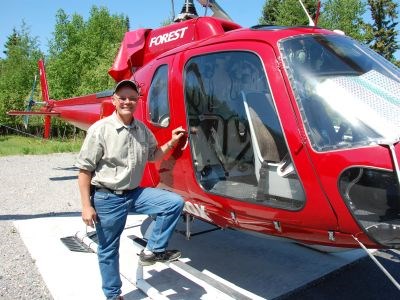A Kenora aviation company is following the mineral trail due north to broaden its horizons in Canada’s Far North.
Mineral exploration has been a saving grace for Forest Helicopters after years of working in the declining forest industry.
“A real significant part of what we do is exploration,” said company president Bart Stevenson, a pilot of 38 years, who operates the 24-employee outfit from his waterfront home on the Winnipeg River about 10 minutes north of town.
“I can recall those days when someone called to move a drill or stake claims and we were in a state of shock. We did hardly any of that but in the last five or six years, it's been booming and you kind of wonder when it's going to slow down.”
About 85 per cent of the company’s revenue comes from exploration and fire suppression work, the most active period being between mid-May and mid-September.
Forest also specializes in aerial construction and power line maintenance support.
With another base at Pickle Lake, the company’s coverage area ranges from the Manitoba border east to Thunder Bay, north to the James Bay Lowlands and the Ring of Fire.
Exploration has led the company further north where it has established a base and a spin off entity at Baker Lake, Nunavut called Forest North Aviation & Logistics, an Inuit joint-venture with business partner and contractor, Peter Tapatai, who runs a fuel expediting business there.
It’s the perfect marriage to service Forest’s uranium exploration clients such as Areva Resources and Cameco.
“It’s good to secure those bigger projects and well-funded companies and work with them.” With eight AS 350 (A-Star) Eurocopters and one Jet Ranger in the fleet, much of what Forest Helicopters does is external load work such as moving drill rigs to new locations and airborne geophysics.
Stevenson called 2011 an “awesome year,” among the best the 15-year-old company has enjoyed, next to 2008, an equally robust year in exploration.
This year, he’s not as enthusiastic and forecasts tough times ahead for helicopter companies by the fall of this year as he’s witnessing more junior miners having difficulty raising money for more grass roots- ype of projects.
“We did some work for a mining company this past winter and we’re a little nervous about getting paid.”
Besides mining companies, Forest Helicopters services some long-time clients in Hydro One, Bell Canada, Environment Canada and various government ministries for fire-suppression work.
Forest Helicopters started in 1997 with one helicopter it purchased from Midwest Helicopters, which ran into financial problems and dissolved.
Stevenson had worked there since 1988. His chief pilot, Norm Jones, came over from Midwest. Forest’s first couple of years in existence couldn't have been better.
Bell Canada was in the midst of a microwave system upgrade north of Pickle Lake and Forest secured the former Midwest contract.
“Norm and I flew about 3,200 hours over two years.”
As work increased, Stevenson started adding to the fleet.
“We’ve run a lean operation. It’s been profitable and it’s almost forced us to buy another asset (helicopter) to reduce our tax liability and that rolls into more work.”
The company is “cautiously entertaining” a move out to the airport where Forest Helicopters would bethe cornerstone tenant supporting a future aviation-industrial park.
That’s tempting to Stevenson, whose hangars are located in his backyard.
“The phone is still here, you can’t get away, 24/7.”
Still energetic at age 58, Stevenson admits he doesn’t have the same drive he used to, and is starting to treasure his personal time. “The sail is not quite as full as it used to be,” and he's contemplating his exit strategy.
“It’s difficult to pull away when it’s right in your backyard. You can’t take a week off at home because you’re sucked into the hangar.”
A new airport hangar would be about a $4-million investment, but Stevenson said he would want another aviation partner on board to share the space and the cost.
“We’re cautious, we’re a debt-free company and a bit old school, that’s why we’re successful. “We’ve done well. We’ve never been in a stressful situation where we’ve had to wonder how are we going to pay the fuel man. I’ve been very fortunate. We have good guys with the company and we’re respected by everyone.”




